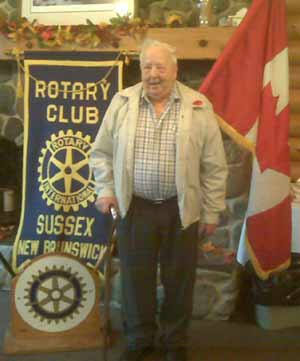
Our very own Harley Geldart was our guest speaker on Nov. 8, 2010. With Remembrance Day coming right up, we were happy to have Harley tell us about his interesting and unforgettable experience in World War II. He has several memories, and he started telling us about one of the things he remembers about being overseas.
He recalled looking at the horizon, and all he could see were tents as far as the eye could see in every direction. It was quite the thing to see, he said. Harley said that the army was quite efficient. They planned for three years in the future and always knew what they were going to be doing. He said he remembered being sick for a few days around D-Day and was in the hospital for a few days; by the time he was out, his position had already been filled...
Ten days after D-Day, he was in France. They were moving wharf platforms to Scotland from France. The piers were made to unload tanks on the shore. He stayed in France for six weeks next to a river, and that was where they bathed. Once they struck out from France, it was a long time before they saw a day that they could get cleaned up. They could go 30-40 miles in a day without showering. They stayed in Holland for the winter next to a river, and they arrived just before Christmas. They had showers there- the first shower for them in four months! They left Holland in February.
He said that one thing we might have a hard time believing is that you can dodge a bullet. He noted that rounds 2, 4 and 7 were tracers in automatic machine guns, and as long as you could see them coming, you had a chance at dodging them. Rangers were supported, and they kept the Germans back with cover fire while the engineers built the bridges. He said he could not believe how fast they could make a bridge. They could get across the Trout Creek River in 4 hours and the Petitcodiac River in a day.
Harley said he was pleased to go home. It was quite an experience, and he was happy to have done it but said that it was not all good. He can remember a day when he saw the bomb bay’s opening in planes flying overhead. It was friendly fire.
He was asked how they battled the cold in the winter, and Harley told us about Tank Suits. He said they zippered up from both feet to his neck; they came in quite handy, and as with that and their long john’s, they were never freezing.
They were 200 miles into Germany when they got news of D-Day. They were especially happy as they were scheduled to go to Berlin, and none of them were looking forward to Berlin.
He was 22 when he joined and 28 when he finished. He served for six years and 18 days. The pay was a double gratuity, which was paid based on each day of service.
Newfoundland was considered overseas in the Second World War as it was no part of Canada until 1949. They left on the Queen Mary with 1500 crew and 33,000 personnel. The ship changed directions every 7 minutes because it took 8 minutes for a sub to surface and lock on to the ship.
Thank you, Harley!
